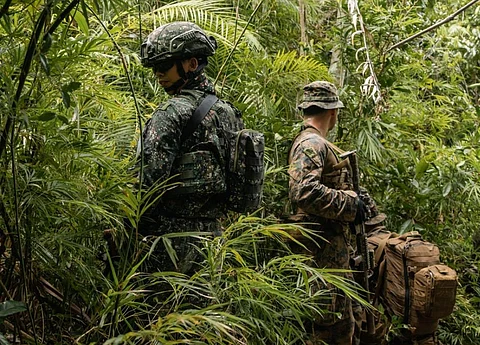
- NEWS
- the EDIT
- COMMENTARY
- BUSINESS
- LIFE
- SHOW
- ACTION
- GLOBAL GOALS
- SNAPS
- DYARYO TIRADA
- MORE

U.S. and Philippine Marines have launched a joint training exercise in Palawan under Archipelagic Coastal Defense (ACD) 25.3, an effort to strengthen both nations' coastal defense and operational readiness in archipelagic environments.
The bilateral training, which runs from 23 June to 15 July 2025, brings together U.S. Marines from Golf Company, 2nd Battalion, 1st Marine Regiment, Marine Rotational Force–Darwin (MRF-D) 25.3, and the Philippine Marine Corps’ 3rd Marine Brigade.
ACD 25.3 includes a series of live-fire drills, jungle patrol operations, survival skills training, and exchanges on small unmanned aerial system (sUAS) tactics. The training will culminate in a coordinated airfield seizure drill at Roxas Airfield, demonstrating the growing interoperability between the two forces.
“The training we conduct during ACD 25.3 directly contributes to our operational readiness and strengthens our coastal defense strategy,” said Brig. Gen. Antonio G. Mangoroban, commander of the 3rd Marine Brigade of the Philippine Marine Corps.
The exercises are part of a broader initiative to support the Armed Forces of the Philippines’ (AFP) Archipelagic Coastal Defense Concept and its ongoing modernization goals. Philippine units participating in the exercise include Marine Battalion Landing Teams, Force Reconnaissance Group, the Coastal Defense Regiment, Explosive Ordnance Disposal teams, engineers, and health service support groups.
Capt. Mark Chase, commander of Golf Company, 2nd Battalion, U.S. Marines, echoed the significance of the collaboration. “This partnership enables both our forces to effectively train, adapt, and respond together in the unique operational environment presented by the Philippine archipelago,” he said.
The ACD exercises underscore the enduring defense cooperation between the Philippines and the United States, a partnership aimed at promoting maritime security and peace across the Indo-Pacific region.
